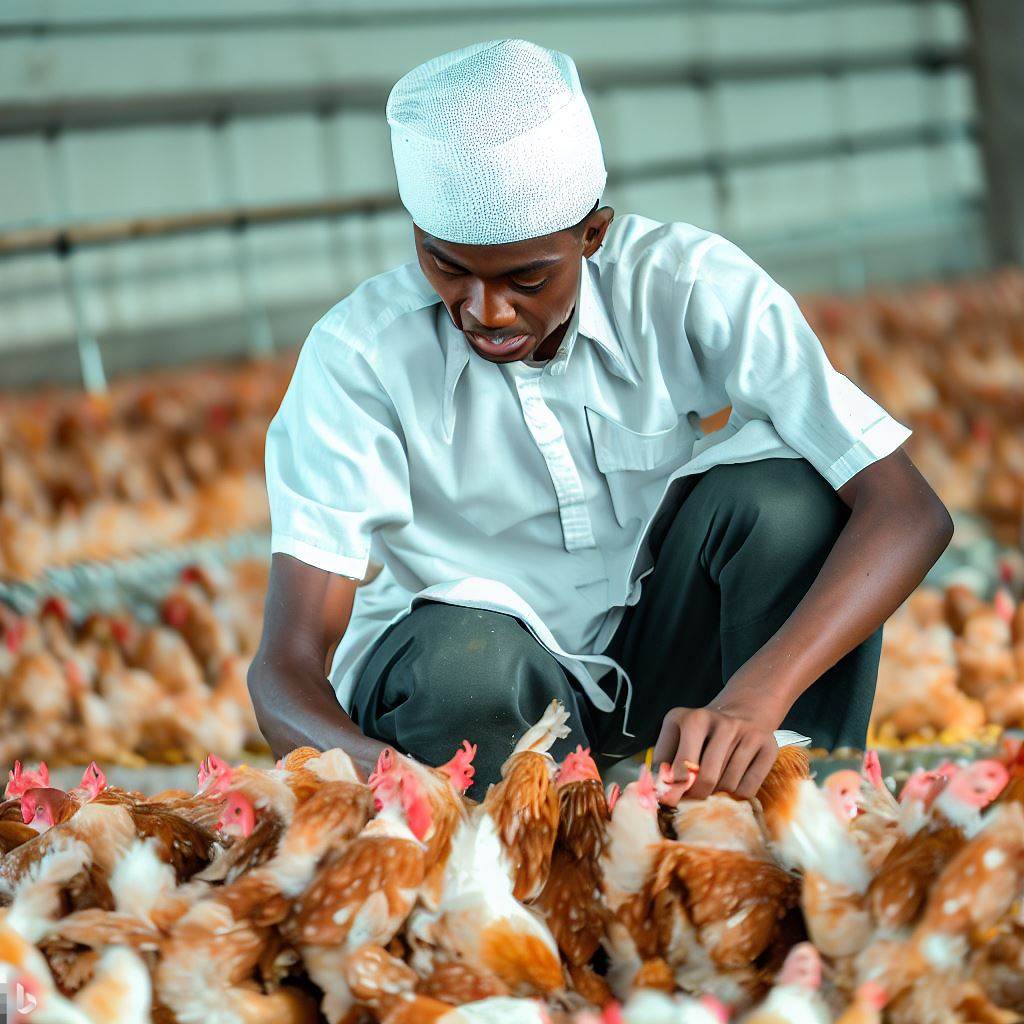Introduction
Poultry production is a proven and viable tool for youth employment in Nigeria.
In a country where youth unemployment is a pressing issue, this industry offers immense potential.
Understanding the importance of youth employment and the thriving poultry industry in Nigeria is crucial.
Youth employment is vital for Nigeria’s future growth and development. It not only provides income and livelihood opportunities for young people but also contributes to poverty reduction and economic stability.
With a large youth population, creating avenues for employment is essential for the country’s progress.
The poultry industry in Nigeria has experienced significant growth in recent years. This sector includes the rearing of chickens, turkeys, ducks, and other poultry for meat and egg production.
It has become a significant source of income for many Nigerians, particularly small-scale farmers.
The poultry industry operates at various scales, from small family-owned enterprises to larger commercial farms.
This diversity allows for a wide range of employment opportunities, from farm workers to managers, marketers, and veterinarians.
It also creates indirect employment through the supply and distribution chains associated with poultry production.
Additionally, the poultry industry contributes to food security in Nigeria. It provides a consistent and affordable source of protein, essential for a balanced diet.
With increasing demand for poultry products, there is a need for more young people to enter the sector and ensure its sustainable growth.
Generally, poultry production offers a viable solution to address youth unemployment in Nigeria.
It not only generates income and employment opportunities but also enhances food security and contributes to economic development.
Encouraging and investing in the youth’s involvement in the poultry industry can have lasting positive impacts on both individuals and the country as a whole.
The Significance of Poultry Production for Youth Employment in Nigeria
Poultry production in Nigeria holds immense significance for youth employment and offers numerous opportunities for economic growth and job creation.
This blog post highlights the high demand for poultry products in Nigeria, the potential for job creation, and the role of poultry production in resolving youth unemployment.
High Demand for Poultry Products in Nigeria
- Nigeria has a large and rapidly growing population, creating a high demand for poultry products.
- Poultry products, such as eggs and chicken, are staple food items consumed by Nigerians on a daily basis.
- The increasing urbanization and changing dietary preferences have contributed to the rising demand for poultry products.
- Additionally, poultry meat and eggs are affordable sources of protein, making them an essential part of Nigerian diets.
- Meeting this demand for poultry products requires a robust and expanding poultry industry.
Potential for Job Creation and Economic Growth
- Poultry production has the potential to generate a significant number of jobs, especially for young people.
- Poultry farms require various skilled and unskilled workers, such as farm managers, veterinarians, feed distributors, and salespersons.
- Supporting industries, such as feed production, equipment manufacturing, and transportation, also benefit from the growth of poultry production.
- The entire poultry value chain provides employment opportunities at different levels, from production to marketing.
- As the poultry industry expands, it contributes to the country’s GDP and overall economic growth.
Poultry Production as a Viable Solution for Youth Unemployment
- Youth unemployment remains a critical challenge in Nigeria, with limited job opportunities for young people.
- Poultry production offers a viable solution by providing job opportunities that require relatively low initial investment.
- Young entrepreneurs can start small-scale poultry farms and gradually expand their businesses.
- Government support through funding, training programs, and access to markets can further enhance youth participation in poultry production.
- Poultry farming is also suitable for rural areas, allowing young people to engage in income-generating activities in their communities.
In short, poultry production holds immense significance for youth employment in Nigeria.
The high demand for poultry products, potential for job creation, and its viability as a solution for youth unemployment make it a valuable sector to invest in.
Both the government and young entrepreneurs need to collaborate to harness the benefits of poultry production, ensuring economic growth and improving the livelihoods of Nigerian youth.
Benefits of poultry production for youth employment
Engaging in poultry production allows young individuals to develop valuable skills such as livestock management, record-keeping, and financial planning.
These skills can be leveraged for entrepreneurship, enabling youth to start their own poultry businesses and create job opportunities for others.
When considering the benefits of poultry production for youth employment, it becomes clear why this industry is a viable tool for Nigeria’s young population.
Low start-up costs and minimal land requirements
One of the significant advantages of poultry production is its low start-up costs.
Young individuals who are interested in venturing into the agricultural sector might find poultry farming more accessible compared to other livestock enterprises.
Setting up a poultry farm requires minimal land, making it an ideal option for youth who may not have extensive access to agricultural land.
With small-scale housing options and innovative techniques like vertical farming, poultry can be reared even in limited spaces.
Furthermore, the initial investment in purchasing poultry birds and necessary equipment is relatively affordable, making it financially feasible for young entrepreneurs starting their careers.
Varied employment opportunities in the poultry value chain
Poultry production offers a diverse range of employment opportunities throughout the entire value chain.
From the primary production phase to subsequent processing and marketing, each stage presents multiple occupations for youth.
On-farm employment possibilities include poultry rearing, where young individuals can actively engage in chicken management, feeding, and healthcare.
Additionally, they can specialize in breeding or become poultry technicians, offering services to other farmers.
The poultry value chain extends beyond on-farm activities.
Opportunities in processing, packaging, marketing, and distribution of poultry products also exist.
Youth can be involved in quality control, packaging design, sales, or establishing their own poultry product brands.
Potential for skills development and entrepreneurship
Engaging in poultry production allows youth to acquire essential skills required for successful agricultural entrepreneurship.
By participating in poultry farming, they develop expertise in livestock management, disease control, and nutrition.
Young poultry farmers can also enhance their business skills by learning financial management, market analysis, and customer relations.
These skills equip them to start and effectively run their own poultry enterprises, creating job opportunities not only for themselves but also for other individuals seeking employment.
Additionally, the knowledge gained through poultry production can be transferred to other areas of agriculture or utilized to provide consultancy services to fellow farmers.
This versatility adds to the attractiveness of poultry farming as a tool for youth employment.
In fact, poultry production offers numerous benefits for youth employment in Nigeria.
The low start-up costs, minimal land requirements, varied employment opportunities, and potential for skills development and entrepreneurship make it an appealing choice for young individuals entering the workforce.
By promoting and supporting poultry farming among youth, Nigeria can harness the full potential of this industry and address the issue of youth unemployment.
Challenges and Obstacles Faced by Youth in Poultry Production
When it comes to poultry production, there are several challenges and obstacles that the youth in Nigeria face, hindering their potential for success.
These obstacles include:
Lack of knowledge and technical skills:
One of the main challenges faced by youth in poultry production is the lack of knowledge and technical skills required to run a successful poultry farm.
Many young individuals lack access to proper training and education, which results in poor management practices and low productivity.
Limited access to capital and loans
Financing is a major obstacle for youth in poultry production. Most young individuals lack the necessary capital to start their own poultry farm or expand their existing operations.
Additionally, traditional financial institutions often hesitate to provide loans to young entrepreneurs due to their perceived lack of experience or collateral.
Inadequate infrastructure and support systems:
The lack of proper infrastructure and support systems is another challenge faced by youth in poultry production.
Inadequate access to electricity, water supply, and transportation makes it difficult for young individuals to establish and maintain their poultry farms.
Additionally, the absence of supportive policies and programs further hampers their growth and success.
The aforementioned challenges significantly impact the potential for youth employment in the poultry production sector in Nigeria.
Overcoming these obstacles requires a multi-faceted approach that involves various stakeholders:
Government intervention
The government should prioritize the provision of technical and vocational training programs tailored specifically to the needs of young individuals interested in poultry production.
Additionally, the government should establish financial schemes and support systems that offer accessible loans and grants to young entrepreneurs.
Private sector collaboration
Private sector entities, such as poultry associations and companies, can play a vital role in addressing these challenges.
They can provide mentorship programs, internship opportunities, and technical support to help youth acquire the necessary skills and knowledge for successful poultry production.
Non-governmental organizations (NGOs)
NGOs specialized in agriculture and youth empowerment can offer training programs, workshops, and networking opportunities that focus on poultry production.
These initiatives can help bridge the knowledge gap and provide youth with the necessary resources to excel in the field.
Improving infrastructure
The government and relevant stakeholders should invest in improving infrastructure, such as electricity, water supply, and transportation networks, in rural areas.
This will facilitate the establishment and growth of poultry farms, particularly those operated by youth.
In the end, the challenges and obstacles faced by youth in poultry production in Nigeria are significant but not insurmountable.
By addressing issues related to knowledge and skills, access to capital, and infrastructure, the potential for youth employment in the poultry production sector can be maximized.
Collaboration between the government, private sector, and NGOs is essential in providing the necessary support and resources to empower young individuals and enable them to succeed in this viable and impactful industry.
Read: Local Chicken Breeds for Poultry Farming in Nigeria

Strategies to Promote Youth Involvement in Poultry Production
Engaging youth in poultry production can be a significant step towards addressing youth unemployment in Nigeria.
By providing opportunities for entrepreneurship and skill development, the poultry sector can empower young individuals to contribute to economic growth.
Here are five strategies to promote youth involvement in poultry production:
Government Support and Policies to Encourage Youth Entrepreneurship
The government should implement supportive policies and provide incentives to attract young individuals to the poultry industry.
This includes creating a favorable business environment, offering tax breaks, and simplifying administrative procedures.
Educational and Training Programs on Poultry Production:
It is crucial to invest in quality education and training programs that specifically focus on poultry production.
These programs should be accessible to young individuals and provide them with the necessary technical knowledge and skills to succeed in the sector.
Access to Financial Services and Microloans for Young Poultry Farmers
One of the main challenges faced by youth in starting their poultry farming ventures is lack of access to finance.
Financial institutions should develop tailored financial products, such as microloans, that are specifically designed for young poultry farmers.
This will enable them to acquire the necessary resources and kick-start their businesses.
Establishment of Youth-Focused Poultry Production Cooperatives:
Forming youth-focused poultry production cooperatives can facilitate knowledge sharing, resource pooling, and collective marketing.
These cooperatives can provide a support network for young farmers and enable them to collectively address challenges in the sector.
Promoting Information and Communication Technology (ICT) Solutions:
Utilizing ICT solutions, such as mobile applications and online platforms, can enhance youth engagement in poultry production.
These technologies can provide access to relevant information, market prices, and best practices, enabling young individuals to make informed decisions and improve their productivity.
In a nutshell, promoting youth involvement in poultry production in Nigeria requires a multi-faceted approach.
The government, educational institutions, financial institutions, and the private sector should collaborate to create an enabling environment that encourages youth entrepreneurship, offers relevant education and training, enhances access to finance, facilitates collaboration, and utilizes technology.
By implementing these strategies, we can unlock the potential of Nigeria’s youth and harness the economic benefits of the poultry sector.
Read: Overcoming Common Diseases in Nigerian Poultry Farms
Success stories of youth engagement in poultry production in Nigeria
Case studies of young individuals who have succeeded in the poultry industry
One success story in the poultry industry is that of Chinedu, a young entrepreneur who started his own poultry farm after completing his agricultural training.
He started with just a small number of chickens but gradually expanded his business and now runs a successful poultry farm.
Publish Your Professional Profile, Business or Brand
Showcase your expertise, gain trust, and boost visibility instantly on Professions.ng.
Publish NowAnother case study is that of Adaeze, a young woman who decided to venture into poultry production as a way to create employment for herself and others in her community.
She started with just a few chickens and over time, her business grew, creating jobs for other youths in her community.
These case studies demonstrate how young individuals in Nigeria can succeed in poultry production through determination, hard work, and entrepreneurial skills.
Lessons learned from their experiences and best practices
From these success stories, several lessons can be learned for those looking to engage in poultry production:
- Start small: It is important to start with a small number of chickens and gradually expand as the business grows.
- Invest in training: Acquiring the necessary skills and knowledge in poultry production is crucial for success.
- Market research: Conducting market research helps identify potential customers, understand their needs, and develop effective marketing strategies.
- Good animal husbandry practices: Adhering to best practices in animal care, feeding, and disease prevention is essential for maintaining a healthy flock.
- Networking and collaboration: Building relationships with other poultry farmers, suppliers, and industry experts can provide valuable support and opportunities for growth.
Exemplary youth-led poultry projects and initiatives
Several youth-led poultry projects and initiatives have emerged in Nigeria, showcasing the potential for youth engagement in this sector:
- Young Farmers Association: This association brings together young farmers engaged in poultry production to share experiences, knowledge, and support.
- Poultry Entrepreneurship Program: This program provides young entrepreneurs with training, mentorship, and access to financing to establish and grow their poultry businesses.
- Mobile Poultry Unit: This initiative involves a mobile unit that provides poultry production training and resources to rural communities, empowering young individuals to start their own businesses.
- Poultry Cooperative: Youth-led cooperatives have been formed, allowing young farmers to pool resources, share knowledge, and collectively market their poultry products.
- Technology-driven startups: Young entrepreneurs have developed innovative technology solutions to improve poultry production, such as mobile apps for monitoring flock health and productivity.
These initiatives highlight the creativity and determination of young individuals in Nigeria in leveraging poultry production as a tool for employment and economic empowerment.
Read: The Power of Poultry: Boosting Nigeria’s Food Security
Role of technology in enhancing youth employment in poultry production
Technology has become a crucial tool in various industries, including poultry production.
In Nigeria, where youth employment is a pressing issue, the role of technology cannot be understated.
It offers numerous opportunities and benefits, empowering young people to succeed in the poultry farming sector.
Let’s explore some of the ways technology enhances youth employment in poultry production.
Digital tools and innovations for efficient poultry farming
- Automated feeding and watering systems streamline poultry farm operations, reducing labor requirements.
- Sensor-based technologies monitor poultry health and behavior, allowing for early detection of diseases.
- Remote monitoring and control systems enable farmers to manage their poultry farms from anywhere.
- Data-driven decision-making tools help optimize resource allocation and improve overall farm performance.
Use of online platforms for selling poultry products
- Online marketplaces provide a wider customer reach, eliminating geographical limitations.
- Direct-to-consumer platforms allow young poultry farmers to bypass intermediaries and maximize profits.
- Virtual storefronts facilitate product showcasing, attracting potential buyers and boosting sales.
- Online payment systems ensure secure transactions and minimize payment delays.
Access to information and resources through mobile applications
- Mobile apps offer educational resources, training modules, and tutorials for aspiring poultry farmers.
- Real-time market data and industry trends enable informed decision-making and strategic planning.
- Weather forecasting apps assist in adjusting farm management practices based on weather conditions.
- Mobile apps provide networking opportunities, connecting young farmers with industry experts and mentors.
By embracing technology, Nigerian youth can harness its potential to create sustainable employment in the poultry production sector.
However, to fully leverage these benefits, it is essential to address issues such as access to technology, digital literacy, and infrastructure challenges in rural areas.
In essence, the role of technology in enhancing youth employment in poultry production cannot be underestimated.
Digital tools and innovations streamline farming operations, online platforms enable wider market access, and mobile applications provide valuable resources and networking opportunities.
As Nigeria continues to address youth unemployment, utilizing technology in the poultry farming sector can offer a viable solution for creating sustainable employment opportunities for the country’s youth.
Read: Poultry Waste Management: Best Practices in Nigeria
Conclusion
Poultry production offers immense opportunities for youth employment in Nigeria.
Throughout this blog post, we have highlighted the importance of engaging young people in this sector and the potential impact it can have on the economy.
By recapitulating the significance of poultry production for youth employment, we emphasize that it not only provides job opportunities but also helps alleviate poverty and reduce unemployment rates.
To address the challenges and unlock the full potential of youth-led poultry businesses, it is crucial that stakeholders, such as the government and private sector, come together to support and invest in youth engagement in this field.
A call to action is needed to create favorable policies, provide training and mentorship programs, and allocate resources to empower young people in poultry production.
Additionally, the development of incubation centers and access to affordable finance can further boost the growth of youth-led poultry businesses and create a more vibrant economy.
By harnessing the energy, creativity, and technological expertise of young Nigerians, the poultry sector can experience significant growth, enhancing food security, economic stability, and sustainable development.
In summary, investing in youth-led poultry businesses not only benefits the individuals themselves but also contributes to the overall socioeconomic progress of Nigeria.




